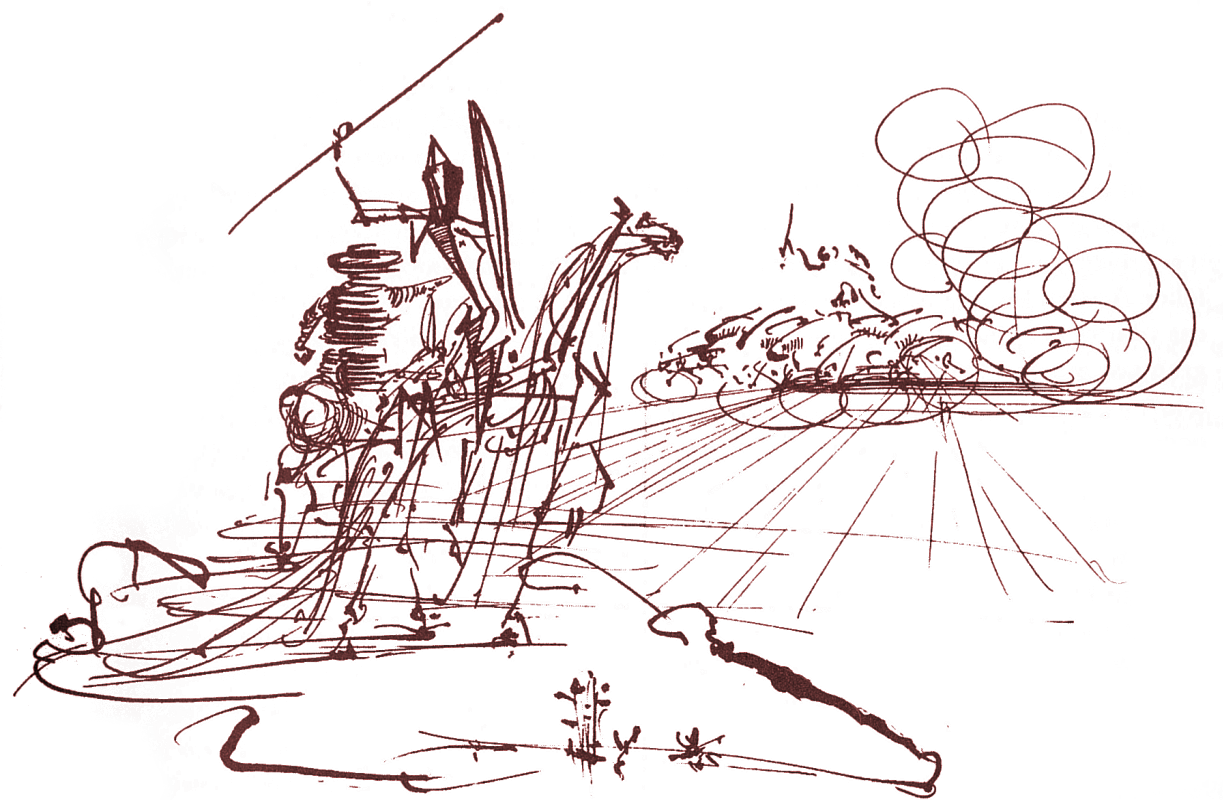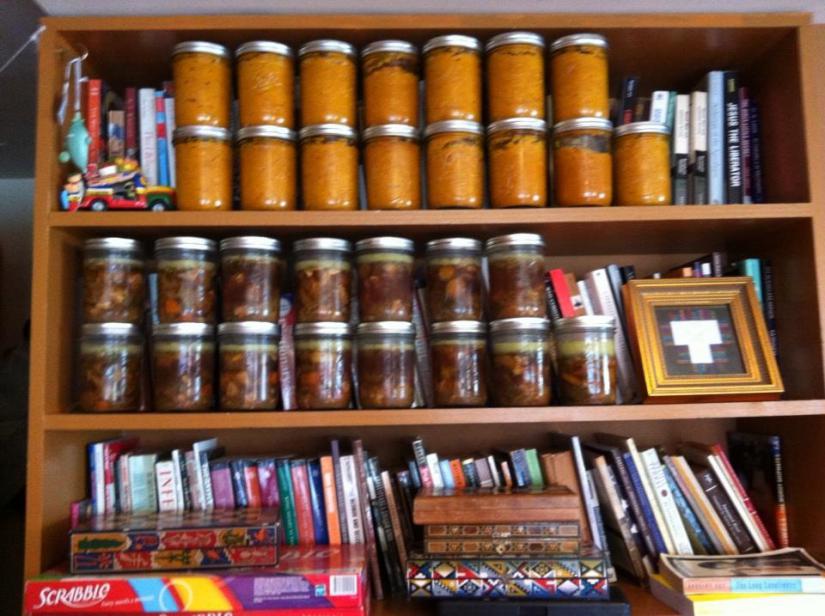Back in 2004, on our honeymoon in Central America, visiting the remote sites of US-inspired massacres, I caught giardia, an intestinal parasite, and I held onto it for five years despite multiple courses of antibiotics. I spent many Saturdays napping, barely holding it together from the week. I felt like my insides were falling apart. My body's natural healing processes were disrupted, and I developed carpal tunnel, a sometimes painful musculo-skeletal disorder. I found that I couldn't digest lactose and a number of other things.
Giardia is hard to test for, and I proved this by testing negative for it. Finally, we found giardia in my system and I took an epic course of antibiotics that destroyed it. But my system was still massively disrupted. The changes in my system had allowed a negative bacteria to take over my gut. I was still pretty sick, and worse, sometimes I'd get sicker for mysterious reasons. I still couldn't digest a unidentifiable but diverse spectrum of foods.
What was worse than any of this was my brain fog. Clarity was the drug that saved me from all other drugs, and I've been addicted to it ever since. My concentration was limited by my body's stamina, and I developed something that felt like ADD. In a manner of speaking.
 I went to another doctor who diagnosed me with SIBO (small intestinal bacterial overgrowth), or a bacterial imbalance in the small intestine. The bacteria of the small intestine do the initial work of digestion, and the wrong bacteria can produce toxins or leave food undigested, causing poor digestion and bad nutrient absorption. The gold standard for detecting SIBO is the lactulose hydrogen breath test, which is cheap and easy to administer, it just requires that you drink a sugar solution and blow into a tube at regular intervals for two hours. My more classic SIBO symptoms were digestive upset, intolerance for sugars/desserts, and burping at very regular intervals about 15-45 minutes after a meal, but symptoms can vary.
I went to another doctor who diagnosed me with SIBO (small intestinal bacterial overgrowth), or a bacterial imbalance in the small intestine. The bacteria of the small intestine do the initial work of digestion, and the wrong bacteria can produce toxins or leave food undigested, causing poor digestion and bad nutrient absorption. The gold standard for detecting SIBO is the lactulose hydrogen breath test, which is cheap and easy to administer, it just requires that you drink a sugar solution and blow into a tube at regular intervals for two hours. My more classic SIBO symptoms were digestive upset, intolerance for sugars/desserts, and burping at very regular intervals about 15-45 minutes after a meal, but symptoms can vary.
My GI doctor prescribed me the antibiotic Xifaxin, a probiotic, and a digestive with every meal. He said I probably had multiple carbohydrate intolerances and mentioned the Specific Carbohydrate Diet as a way to avoid symptoms.
Disclaimer: Before you go getting the wrong idea, this is not medical advice and I am not a doctor. I'm a dude, telling you what has helped me. From a legal perspective, my advice is to visit a doctor and obey them as you would an angry god.
King of Digestion
I took Xifaxin and felt like a Red Bull King, feasting on whatever I wanted with energy to spare (this is just how normal people feel all the time). But when I was off of it, I began to get sick again. I wasn't certain of what I could or couldn't eat. The diet my doctor mentioned would require that I cook all my own meals from scratch. No thank you. But I felt worse and worse. Xifaxin is a very expensive patented antibiotic that doesn't mess up your system like other ones because it isn't absorbed through the wall of the intestine, so it just basically affects intestinal bacteria. Other antibiotics make you feel terrible when you're on them.
I couldn't stay on Xifaxin forever, and I wanted to correct the problem for good. And so I started a variant of the Specific Carbohydrate Diet called the Gut and Psychology diet. I read Natasha Campbell's book. The principle is to avoid multi-chain carbohydrates: disaccharides and polysaccharides. The theory is that the bad bacteria feed on these. You're supposed to begin by eating soups exclusively for a week or so, gradually introducing foods in an order and watching for reactions until you can eventually eat the full GAPs diet. You stay on this for a year or so and then, when you're stable, start introducing things like sweet potatoes.
Let me be clear: this diet excluded all grains and starchy vegetables: no wheat, oats, rye, potato, beans, rice, or sugar. No sweetener other than honey. All meals are to be prepared from scratch from pure ingredients.
Note: If you're reading this and considering following Gaps, you have to read the book. Don't just read blogs. You don't want to mess this up, it's too much work to try it and get it wrong.
Following Gaps
I found that if I followed Gaps, I was mostly well and my concentration mostly returned. But I never started at the beginning of the diet. I just started with full GAPs, and skipped the introductory phases. I was working as an organizer, so, along with my home-cooked soups, I ate salads from Sweet Green or Chop't for lunch, some of the few GAPs-friendly foods I could actually eat on my limited diet. I brought soups to restaurants in a thermos, or ordered burgers with green salads. No beer. Only a little wine every now and again, and sometimes that didn't even treat me well. I ate squash instead of potatoes and bread.
I had always had GERD, and I had been taking stomach acid reducers like Pepcid AC. Now, instead, I took three or four Betaine HCL pills with each meal, which is actually stomach acid. This helped tremendously. Turns out acid reflux may be caused by too little stomach acid (link to book I haven't read).
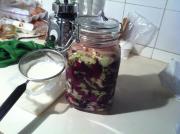 I was a fermenter, experimenting with ways to salt-cure foods and home-brew bacteria for my gut. I made my own yogurt, pickles, and sauerkraut. Gut bacteria are way more important than we'd ever thought. There's plenty of research on probiotics that show that bacteria play a role in happiness. For instance, studies show that mice who consume lactobacilli are happier than mice that don't. Medicine is really just beginning to uncover the gut-psychology link. And, it turns out that the bacteria that we casually slaughter with antibiotics are the first line of defense against invading bacteria and are responsible for psychological well-being via the vagus nerve.
I was a fermenter, experimenting with ways to salt-cure foods and home-brew bacteria for my gut. I made my own yogurt, pickles, and sauerkraut. Gut bacteria are way more important than we'd ever thought. There's plenty of research on probiotics that show that bacteria play a role in happiness. For instance, studies show that mice who consume lactobacilli are happier than mice that don't. Medicine is really just beginning to uncover the gut-psychology link. And, it turns out that the bacteria that we casually slaughter with antibiotics are the first line of defense against invading bacteria and are responsible for psychological well-being via the vagus nerve.
Note: The ferments that were most helpful to me were SCD-legal homemade yogurt (I use Fage greek yogurt as a starter), saurkraut (about 1 month to ferment, using a sealed jar, here are some good tips on sauerkraut)
I was on a journey to the sources of things, the places that meats came from, what cows ate and how that affects you, and food become something of a spiritual discipline for me as well as a justice issue. Turns out that eating cows or drinking milk from cows that are fed corn rather than grass are high in bad omega 6 fats, and will cause inflammation. That pesticides can increase your general toxic load and contribute to inflammation as well. That inflammation rather than LDL cholesterol per se causes artherosclerosis. That a bad gut can cause inflammation and, compounded by other things, carpal tunnel.
Bad for Health, Bad for the Earth
But it also turns out that many of the foods that are destructive to the earth are disrupting our bodies and our minds as well. Interesting. And that all the cheapest foods, the foods that poor people are eating, processed foods and fast foods, are the ones that can disrupt the gut, the heart, the mind, and the ecosystem the most.
As part of my journey, I began organizing farm-to-church delivery networks for fresh organic produce.
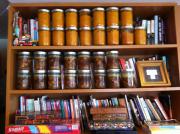 I dehydrated food and vac-packed it for snacks (especially dehydrated pureed, cooked butternut squash with coconut oil, vanilla, and honey), but traveling was awful. I'd eat something at a restaurant, only to get sick later. After some research, I discovered that many things sourced by large restaurant supply chains like SysCo add arbitrary fillers and additives like dextrose to seemingly pure foods that could mess me up. I found out that even the salads I was eating nearly every day from my favorite locally-source restaurant had cane sugar in the chicken.
I dehydrated food and vac-packed it for snacks (especially dehydrated pureed, cooked butternut squash with coconut oil, vanilla, and honey), but traveling was awful. I'd eat something at a restaurant, only to get sick later. After some research, I discovered that many things sourced by large restaurant supply chains like SysCo add arbitrary fillers and additives like dextrose to seemingly pure foods that could mess me up. I found out that even the salads I was eating nearly every day from my favorite locally-source restaurant had cane sugar in the chicken.
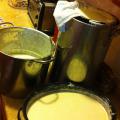 I had been on this diet for about a year and a half. But I realized that I was stuck on phase three or so of the GAPs diet. I was failing to progress, and part of it was because I hadn't been strict enough. I decided to start at the beginning. So I ate only hearty stews for about 3 months. I got a deep freezer and a canner and starting cooking in bulk. I started to move through the phases slowly, making sure to keep my digestion strong and good as I gradually introduced things.
I had been on this diet for about a year and a half. But I realized that I was stuck on phase three or so of the GAPs diet. I was failing to progress, and part of it was because I hadn't been strict enough. I decided to start at the beginning. So I ate only hearty stews for about 3 months. I got a deep freezer and a canner and starting cooking in bulk. I started to move through the phases slowly, making sure to keep my digestion strong and good as I gradually introduced things.
Note: Listen to your body carefully, no matter what your diet tells you. Nut butters, nuts, and nut flours never worked for me and they still don't. These are part of what you're supposed to introduce in the early phase of Gaps and SCD. This was confusing and sad for me, but after I learned it, I was able to progress.
Note 2: I also tried a home faecal transplant. Damn straight I did. It seemed to help, but I just did it once and I should have done it every day for a week.
Getting Better
At about stage five or so of my diet, I did a couple of things. First, I got an allergy panel and found I was faintly allergic to peppermint and black pepper which had been mainstays of my diet. So I eliminated them. Next, I cut out one of my probiotics, the Otho Biotic probiotic that included sacchormyces boullardi and bifidobacteria. I think bifidobacteria were bad for me. I continue to take only Probio PCC, the only probiotic which was recommended by my doctor. That probiotic definitely helps my condition.
I took lots oregano, berbercap, and ginger pills three times a day for a month or so as a natural antibiotic, like three pills of each. I also got very sick one night by drinking way too much champagne, and when I was done, the acidic system cleanse it gave me seemed to help. I think that when you're sick, your system bathes your gut in stomach acid and bile, and this can serve as a natural antibiotic.
My digestion started seriously improving.
I started introducing more foods, being more adventurous. Every other time I'd tried introducing too many foods, I'd have digestive troubles that could take a week or so to sort out. But this time I just kept going.
Eventually, I drank a beer. And ate some bread. And pizza. Sweet potato fries. A cubano. A burrito. A muffin. Whiskey. Sour cream. And somehow, I was mostly fine.
That lasted for a few weeks. Now, I really can't eat wheat, corn, beans, nuts, and lactose. But yeah, I can sometimes have a piece of cake. I pay the price, but just for a couple of days. I still eat lots of saurkraut and make my own yogurt. And, with each meal, I take Betaine HCL and Isotonix digestive enzyme. But compared to how I was before, I'm practically normal. I can work in the evenings, rather than just collapse in exhaustion. And my mind is clear, finally.
Here's what helped me.
- Learning about my condition here.
- Gaps diet
- Fermentation, here's the best site to get you going
- Finding the RIGHT probiotic. Be scientific, experiment.
- Ginger and oregano pills.
- Chew each bite lots and eat slowly. Don't drink water during or for an hour after eating. Saliva is a natural digestive, and water can dilute your stomach acid.
- Get a spiritual discipline. Meditate or pray in ways that calm your body and mind. Read: not spiritual warfare or self-castigation.
 Nowadays, I'm happy. We live in Ecuador, and during the days, I'm writing a novel and building a website for farm-to-table networks, and I have a little boy and a wonderful wife. I can generally eat stuff in restaurants, though some genres like Italian are still off limits. Hope this post has been helpful. If you have any questions, post them below in a comment and I'll answer!
Nowadays, I'm happy. We live in Ecuador, and during the days, I'm writing a novel and building a website for farm-to-table networks, and I have a little boy and a wonderful wife. I can generally eat stuff in restaurants, though some genres like Italian are still off limits. Hope this post has been helpful. If you have any questions, post them below in a comment and I'll answer!
Feb 25, 2015 update: I'm living in Indiana now, I had something of a relapse after taking an antibiotic for the cold over Christmas, but nothing as bad as it used to be. I'm back hard at work in the kitchen, making foods that I can eat, and on the mend.
